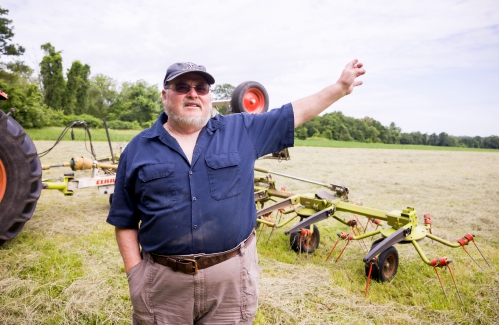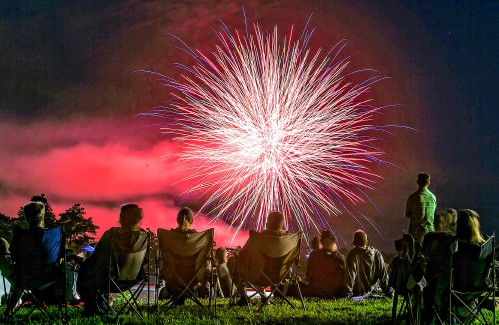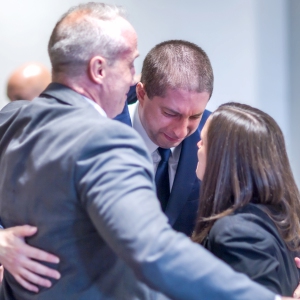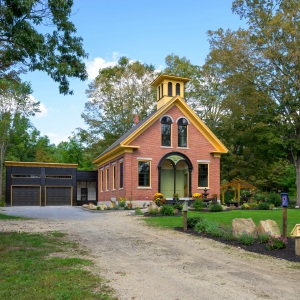
‘There’s tradition up here’ – Morrill Farm approaches its centennial, celebrates evolution and growth
A golf cart hauling two of Rob Morrill’s biggest blessings – a pair of children with tousled hair and chattering voices – careened along the dirt path coursing through Morrill Farm.

Celebrating independence: A list of local July 4 celebrations
As Independence Day approaches, many places in the Concord area prepare to host an array of patriotic festivities. A sampling of celebrations are listed below. All are scheduled for Friday, July 4, unless otherwise noted:
Most Read
 Bill to allow ‘no fault’ evictions makes it to governor’s desk
Bill to allow ‘no fault’ evictions makes it to governor’s desk
 ‘He’s coming home’: Jury acquits former prison guard Matthew Millar in murder trial
‘He’s coming home’: Jury acquits former prison guard Matthew Millar in murder trial
 Look, up in the sky! It’s… an Airstream trailer?
Look, up in the sky! It’s… an Airstream trailer?
 Around Concord: Living in an 1856 schoolhouse is (mostly) delightful
Around Concord: Living in an 1856 schoolhouse is (mostly) delightful
 Slots and no bet limits: State budget shakes up New Hampshire’s casino landscape
Slots and no bet limits: State budget shakes up New Hampshire’s casino landscape
 ‘Deep flavor’ – New restaurant in downtown Concord offers creative spin on comfort food and cocktails
‘Deep flavor’ – New restaurant in downtown Concord offers creative spin on comfort food and cocktails
Editors Picks
 A Webster property was sold for unpaid taxes in 2021. Now, the former owner wants his money back
A Webster property was sold for unpaid taxes in 2021. Now, the former owner wants his money back
 Report to Readers: Your support helps us produce impactful reporting
Report to Readers: Your support helps us produce impactful reporting
 City prepares to clear, clean longstanding encampments in Healy Park
City prepares to clear, clean longstanding encampments in Healy Park
 Productive or poisonous? Yearslong clubhouse fight ends with council approval
Productive or poisonous? Yearslong clubhouse fight ends with council approval
Sports

Six local seniors play in CHaD East-West All-Star Football game; Nyhan wins MVP
A series of smart plays by Colby Nyhan opened the scoring in Friday’s CHaD East-West All-Star Football Game, his last in a Concord High uniform. Nyhan scored the night’s first touchdown with a 19-yard QB run up the middle and made the extra point as a kicker to lead the West to a 13-7 win over the East in Manchester.
 Concord Monitor Spring Players of the Season
Concord Monitor Spring Players of the Season
 Athlete of the Week: Nate Kiah, Bow Falcons
Athlete of the Week: Nate Kiah, Bow Falcons
Opinion

Opinion: What Coolidge’s century-old decision can teach us today
One hundred years ago this July, a quiet man from Vermont — Calvin Coolidge — made a decision that changed the course of Sino-American relations.
 Opinion: The art of diplomacy
Opinion: The art of diplomacy
 Opinion: After Roe: Three years of resistance, care and community
Opinion: After Roe: Three years of resistance, care and community
 Opinion: Iran and Gaza: A U.S. foreign policy of barbarism
Opinion: Iran and Gaza: A U.S. foreign policy of barbarism
 Opinion: There’s no place like firearms-free zones
Opinion: There’s no place like firearms-free zones

Your Daily Puzzles

An approachable redesign to a classic. Explore our "hints."

A quick daily flip. Finally, someone cracked the code on digital jigsaw puzzles.

Chess but with chaos: Every day is a unique, wacky board.

Word search but as a strategy game. Clearing the board feels really good.

Align the letters in just the right way to spell a word. And then more words.
Politics

New Hampshire school phone ban could be among strictest in the country
When Gov. Kelly Ayotte called on the state legislature to pass a school phone ban in January, the pivotal question wasn’t whether the widely popular policy would pass but how far it would go.
 Sununu decides he won’t run for Senate despite praise from Trump
Sununu decides he won’t run for Senate despite praise from Trump
Arts & Life

The Rebel Collective to perform in Henniker
If you like the Dropkick Murphys, then The Rebel Collective might be the band for you. They will be the featured performers at the Tuesday, July 1 Henniker Concert Series in the Angela Robinson Bandstand, Community Park at 6 p.m.
 Meet Moriah Billups, Young Professional of the Year
Meet Moriah Billups, Young Professional of the Year
 Artist spotlight: Leah Kuehne
Artist spotlight: Leah Kuehne
Obituaries
 Winston H. McCarty
Winston H. McCarty
Tilton, NH - Winston 'Win' Herbert McCarty died on June 26, 2025, at the New Hampshire Veterans Home, following a heart attack. At the time of his passing, he was surrounded by family, caregivers and fellow veterans. He was 96. Wins... remainder of obit for Winston H. McCarty
 Larry L. Leppard
Larry L. Leppard
Epsom, NH - Larry L. Leppard, 81, of Epsom, passed away at his residence on Friday, June 27, 2025. Larry was born on August 10, 1943, in Ft. Blanding, FL; son of the late Lawrence Leppard and June (Davis) Prunner. Larry was educated in... remainder of obit for Larry L. Leppard
 Angelyn M. D'Ambruoso
Angelyn M. D'Ambruoso
Hopkinton, NH - Angelyn D'Ambruoso died peacefully on June 25th, surrounded by her children - Kristen Scappaticci and her husband Mike, Mark D'Ambruoso and his wife Tami, and Lisa Demers and her husband Joe - and her six adored grandchi... remainder of obit for Angelyn M. D'Ambruoso
 Nancy Phelps
Nancy Phelps
Danbury, NH - Nancy Allen (Miniszek) Phelps aka: Dr. Cooper, Dr. Phelps Nancy Allen (Miniszek) Phelps, 73, of School Pond Road, died Saturday, June 28, 2025 at her home. She was born and raised in Brattleboro, VT the daughter ... remainder of obit for Nancy Phelps


 Around Concord: Refreshing recipes from Table Bakery
Around Concord: Refreshing recipes from Table Bakery
 Federal government to appeal New Hampshire judge’s ruling on legal status of Dartmouth international student
Federal government to appeal New Hampshire judge’s ruling on legal status of Dartmouth international student
 AG: Seven officers justified in fatal shooting of a Kensington man
AG: Seven officers justified in fatal shooting of a Kensington man
 Second arrest made in June shooting beneath South End bridge
Second arrest made in June shooting beneath South End bridge
 Self-drawing coffee shop artwork re-creates the Declaration of Independence
Self-drawing coffee shop artwork re-creates the Declaration of Independence
 Sunapee’s Bryce Whitlow keeps memory of above-average MLB players alive through social media page ‘MLB Hall of (Pretty) Good’
Sunapee’s Bryce Whitlow keeps memory of above-average MLB players alive through social media page ‘MLB Hall of (Pretty) Good’

 Track & field: Hopkinton’s Lane wins New England title in 3,200 meters, Concord’s Saysaw runs state record times in 100 and 200
Track & field: Hopkinton’s Lane wins New England title in 3,200 meters, Concord’s Saysaw runs state record times in 100 and 200 Boys’ Lacrosse: Bears narrowly lose to Plymouth in D-III championship, 7-5
Boys’ Lacrosse: Bears narrowly lose to Plymouth in D-III championship, 7-5 Concord became a Housing Champion. Now, state lawmakers could eliminate the funding.
Concord became a Housing Champion. Now, state lawmakers could eliminate the funding. ‘A wild accusation’: House votes to nix Child Advocate after Rep. suggests legislative interference
‘A wild accusation’: House votes to nix Child Advocate after Rep. suggests legislative interference  Town elections offer preview of citizenship voting rules being considered nationwide
Town elections offer preview of citizenship voting rules being considered nationwide “A Time to Gather Stones,” based on a local historical crime, premieres in Pittsfield
“A Time to Gather Stones,” based on a local historical crime, premieres in Pittsfield Making music: Contoocook-raised Derek Astles celebrates new album, old collaborations
Making music: Contoocook-raised Derek Astles celebrates new album, old collaborations
